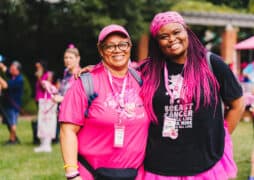
Loretta Sealey was diagnosed with stage 2 triple negative breast cancer in June 2020. She has always undergone yearly mammograms and credits this for her cancer being found early. This is her story in her own words.
Up until March 2020, Loretta was diligent about getting her yearly mammogram. Her maternal grandmother had been diagnosed with breast cancer, so Loretta made sure to go for one every year. But due to the pandemic, her annual appointment was pushed back until June that year, something for which she’s grateful. “I’m not sure they would have caught it if I’d gone in March,” she said. “I never felt anything. I didn’t feel bad.”
Loretta’s mammogram was on a Friday. On Monday, her doctor’s office called and asked her to come back in for a 3D mammogram and an ultrasound. A week later, Loretta was diagnosed with stage 2 triple negative breast cancer. “When I got the call to come back for the 3D mammogram, I tried my best to stay positive,” Loretta said. “But when I got the diagnosis, I was mad. Why this? Why now?”
In the days leading up to treatment, Loretta underwent genetic testing. The mother of two grown sons, she wanted to be sure she wasn’t passing an inherited gene mutation to them. After several denials from her health insurance, she was finally able to undergo the testing, which came back negative for any inherited gene mutations. “That gave me peace,” she said. “I know men can get breast cancer, so to know I didn’t carry anything was a relief.”
Treatment included chemotherapy, a lumpectomy and radiation therapy. At times, the effects of treatment were hard. While on oral chemotherapy, the skin on Loretta’s feet began to peel. “It’s just wicked,” she said. “During my second cycle, my feet were awful. I had a lot of pain, and it was difficult to walk.”
The targeted radiation therapy also hit Loretta hard. “The area under my breast got irritated, right where my bra hit. But I told my doctor, and she was able to give me samples to help with the burns. We needed to do everything we could to heal the skin, so it wouldn’t get infected,” Loretta explained.


“My entire care team was just wonderful. They listened to my concerns and tried to do what they could to help me,” she said. Loretta’s parents and sons were also there for her. Her dad went to every oncology appointment with her. On the day of her surgery, one of her sons joined her at the hospital while her parents waited in the parking lot since only one person could accompany her inside.
During this time, Loretta reflected a lot. She realized that her husband at the time was not there for her in the ways she needed him to be. She thought about going back to school. Once she finished treatment, she took action. She filed for divorce and enrolled in online college courses. She’ll receive her associate’s degree in December.
“There were some dark days and some dark holes I had to pull myself out of,” Loretta said. “But I’m still here. I’m happy. And I would tell anyone who will listen: Get your regular mammogram. It could save your life.”
Breast cancer screening and early detection play an important role in your health. Screening tests can help detect breast cancer at an early stage when the chances of survival are highest.
Statements and opinions expressed are that of the individual and do not express the views or opinions of Susan G. Komen. This information is being provided for educational purposes only and is not to be construed as medical advice. Persons with breast cancer should consult their healthcare provider with specific questions or concerns about their treatment.



